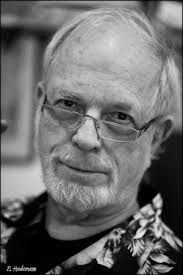Jason Schulman
September 27, 2018

David McReynolds was a titan of the peace and justice movement, a socialist, pacifist, Socialist and Green party political candidate, and photographer. He helped organize one of the earliest draft-card burning protests against the Vietnam War and served on the staff of the War Resisters League for 40 years, remaining active with the organization afterwards. He was the first openly gay presidential candidate for any party, running on the Socialist Party ticket in 1980. His photography included his international travel, civil rights, demonstrations, the War Resister’s League, the Socialist Party, and cats, among other topics.
Jason Schulman, who knew McReynolds, discusses his activist history and political views.
David McReynolds was the first “Old Leftist” I ever met, back in 1996, at one of a number of ill-fated 1990s meetings of representatives of socialist organizations in New York City hoping for some sort of “left unity” around a common project. Strictly speaking, David wasn’t an “Old Leftist” – that label was affixed to members of the Socialist Party (SP), Communist Party (CP) or the Trotskyist groups of the 1930s and 1940s. David was “inbetween” the Old and New Lefts, joining both the SP and the radical-pacifist War Resisters League (WRL) in 1951.
David’s main inspiration was the Communist-turned-socialist-pacifist Bayard Rustin (1912-1987), who by 1949 was the organizer for “race relations” in the Fellowship of Reconciliation (FOR), an interfaith nonviolent-action organization. David – who refused being drafted into the Korean War and won his case “on a technicality” – began working for Liberation magazine in 1957 under Rustin and A.J. Muste (1885-1967), who was a founder of the FOR (and a former Trotskyist). In 1960 he became a “peace movement bureaucrat,” becoming part of the WRL staff where he remained until retiring in 1999. He helped Rustin organize the 1963 March on Washington for Jobs and Freedom, organized one of the first draft card burnings, wrote often for the explicitly pacifist WIN magazine, and played a major role in some important demonstrations against the Vietnam War.
In the early 1970s, David’s anti-war Debs Caucus finally split from the Cold Warriors who dominated the re-named SP, the Social Democrats USA (SDUSA), taking the name “Socialist Party USA.” The SPUSA would be David’s primary “socialist home” until 2015, when he resigned, claiming that the party had neither a healthy internal life nor political relevance. He also paid dues to the Democratic Socialists of America (DSA) from the 1980s until his death.
But long before 2015, David was the first openly gay man to run for president, on the SP ticket in 1980. He did the same again in 2000, leading to an appearance on Bill Maher’s “Politically Incorrect” show on ABC, winning over much of the audience to Maher’s chagrin. Unlike Rustin, who had been “outed” in 1953 via being “busted” for “lewd conduct” in a parked car with another man, David came out in the pages of WIN in 1969. He revealed that he’d been aware of his sexual orientation since 1949, when he began a brief relationship with Alvin Ailey at UCLA, where both men were undergraduates. Ailey, of course, later became a celebrated choreographer, popularizer of modern dance, and founder of the Alvin Ailey American Dance Theater. (Ironically, before running for president, David had run for Congress from Lower Manhattan as a candidate of the Peace and Freedom Party in 1968 – when the Party’s presidential candidate was the notoriously homophobic Eldridge Cleaver of the Black Panther Party.) He would again run for office as a Senate candidate for the New York State Green Party in 2004.
Although for a time David was on the editorial board of the “Third Camp” socialist magazine New Politics and he considered himself a Marxist, his overall political orientation was fairly distant from the heterodox Trotskyism that informed the outlook of NP’s founding editors, the late Julius and Phyllis Jacobson. Undoubtedly this was partly due to David’s anger at having been “burned” by the Jacobsons’ former comrades in the Independent Socialist League (ISL), particularly by its leader Max Shachtman. The ISL had dissolved their organization and joined the SP as individuals in 1958. David, who was on the left edge of the SP, expected that the ex-ISL members would push the Party to be more radical. The exact opposite happened, as many “Shachtmanites” – who became the dominant faction in the SP – soon expressed support (“critically,” of course) for the Bay of Pigs invasion, the Lyndon Johnson administration, and the Vietnam War. (Tragically, Bayard Rustin joined this faction, abandoning his socialist pacifism.) David also believed that the orthodox Trotskyists of the Socialist Workers Party (SWP) played a “splitter” role in the anti-Vietnam War movement. So it isn’t that surprising that David decided that “Stalinism versus Trotskyism” was really little more than a remnant of a power struggle between two authoritarian individuals, though he did admire “Shachtmanites” who retained their old political perspectives, such as Hal Draper and others around NP.
David was a very warm person and was my only connection to deceased figures of the “literary left” such as Allen Ginsberg and James Baldwin. I admired him. Over time, however, it became clear that our outlooks were rather different. That said, most of the time, David was on the right side, and I will miss him.
Jason Schulman is a co-editor of New Politics. He is the editor of Rosa Luxemburg: Her Life and Legacy (Palgrave Macmillan, 2013) and author of Neoliberal Labour Governments and the Union Response (Palgrave Macmillan, 2015).
